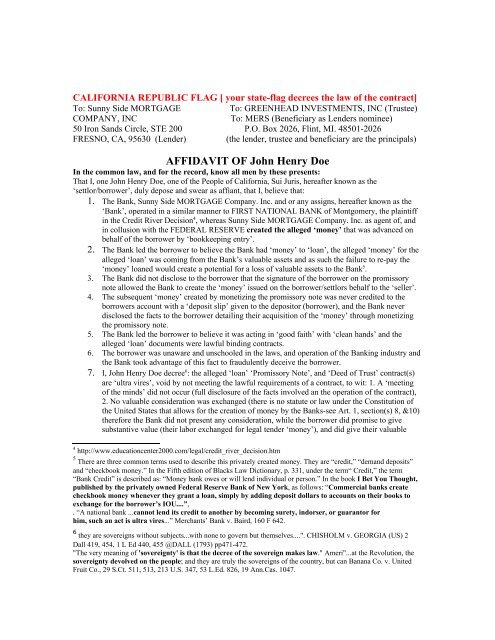Mortgage-KillerEX
Mortgage-KillerEX
Mortgage-KillerEX
Create successful ePaper yourself
Turn your PDF publications into a flip-book with our unique Google optimized e-Paper software.
CALIFORNIA REPUBLIC FLAG [ your state-flag decrees the law of the contract]<br />
To: Sunny Side MORTGAGE<br />
To: GREENHEAD INVESTMENTS, INC (Trustee)<br />
COMPANY, INC<br />
To: MERS (Beneficiary as Lenders nominee)<br />
50 Iron Sands Circle, STE 200 P.O. Box 2026, Flint, MI. 48501-2026<br />
FRESNO, CA, 95630 (Lender) (the lender, trustee and beneficiary are the principals)<br />
AFFIDAVIT OF John Henry Doe<br />
In the common law, and for the record, know all men by these presents:<br />
That I, one John Henry Doe, one of the People of California, Sui Juris, hereafter known as the<br />
‘settlor/borrower’, duly depose and swear as affiant, that I, believe that:<br />
1. The Bank, Sunny Side MORTGAGE Company. Inc. and or any assigns, hereafter known as the<br />
‘Bank’, operated in a similar manner to FIRST NATIONAL BANK of Montgomery, the plaintiff<br />
in the Credit River Decision 4 , whereas Sunny Side MORTGAGE Company. Inc. as agent of, and<br />
in collusion with the FEDERAL RESERVE created the alleged ‘money’ that was advanced on<br />
behalf of the borrower by ‘bookkeeping entry’.<br />
2. The Bank led the borrower to believe the Bank had ‘money’ to ‘loan’, the alleged ‘money’ for the<br />
alleged ‘loan’ was coming from the Bank’s valuable assets and as such the failure to re-pay the<br />
‘money’ loaned would create a potential for a loss of valuable assets to the Bank 5 .<br />
3. The Bank did not disclose to the borrower that the signature of the borrower on the promissory<br />
note allowed the Bank to create the ‘money’ issued on the borrower/settlors behalf to the ‘seller’.<br />
4. The subsequent ‘money’ created by monetizing the promissory note was never credited to the<br />
borrowers account with a ‘deposit slip’ given to the depositor (borrower), and the Bank never<br />
disclosed the facts to the borrower detailing their acquisition of the ‘money’ through monetizing<br />
the promissory note.<br />
5. The Bank led the borrower to believe it was acting in ‘good faith’ with ‘clean hands’ and the<br />
alleged ‘loan’ documents were lawful binding contracts.<br />
6. The borrower was unaware and unschooled in the laws, and operation of the Banking industry and<br />
the Bank took advantage of this fact to fraudulently deceive the borrower.<br />
7. I, John Henry Doe decree 6 : the alleged ‘loan’ ‘Promissory Note’, and ‘Deed of Trust’ contract(s)<br />
are ‘ultra vires’, void by not meeting the lawful requirements of a contract, to wit: 1. A ‘meeting<br />
of the minds’ did not occur (full disclosure of the facts involved an the operation of the contract),<br />
2. No valuable consideration was exchanged (there is no statute or law under the Constitution of<br />
the United States that allows for the creation of money by the Banks-see Art. 1, section(s) 8, &10)<br />
therefore the Bank did not present any consideration, while the borrower did promise to give<br />
substantive value (their labor exchanged for legal tender ‘money’), and did give their valuable<br />
4<br />
http://www.educationcenter2000.com/legal/credit_river_decision.htm<br />
5 There are three common terms used to describe this privately created money. They are “credit,” “demand deposits”<br />
and “checkbook money.” In the Fifth edition of Blacks Law Dictionary, p. 331, under the term“ Credit,” the term<br />
“Bank Credit” is described as: “Money bank owes or will lend individual or person.” In the book I Bet You Thought,<br />
published by the privately owned Federal Reserve Bank of New York, as follows: “Commercial banks create<br />
checkbook money whenever they grant a loan, simply by adding deposit dollars to accounts on their books to<br />
exchange for the borrower’s IOU....”,<br />
. “A national bank ...cannot lend its credit to another by becoming surety, indorser, or guarantor for<br />
him, such an act is ultra vires...” Merchants’ Bank v. Baird, 160 F 642.<br />
6 they are sovereigns without subjects...with none to govern but themselves....". CHISHOLM v. GEORGIA (US) 2<br />
Dall 419, 454, 1 L Ed 440, 455 @DALL (1793) pp471-472.<br />
"The very meaning of 'sovereignty' is that the decree of the sovereign makes law." Ameri"...at the Revolution, the<br />
sovereignty devolved on the people; and they are truly the sovereigns of the country, but can Banana Co. v. United<br />
Fruit Co., 29 S.Ct. 511, 513, 213 U.S. 347, 53 L.Ed. 826, 19 Ann.Cas. 1047.












![[Pham_Sherisse]_Frommer's_Southeast_Asia(Book4You)](https://img.yumpu.com/38206466/1/166x260/pham-sherisse-frommers-southeast-asiabook4you.jpg?quality=85)




